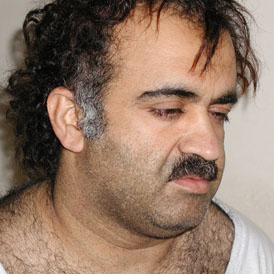Bin Laden: did his death justify water-boarding?
As much of America celebrates the death of Osama bin Laden, questions surface over the use of torture in locating his whereabouts, writes Washington correspondent Sarah Smith.

Amid the on-going jubilation over Osama bin Laden‘s death there is a very serious question settling over the US: Was it because of brutal beatings and simulated drowning in secret “black sites” that they got the information needed to find the al-Qaeda leader?
The senior Democrat on the Senate Intelligence Committee says absolutely not. The top Republican on the House Homeland Security Committee says: “The road to bin Laden began with waterboarding”. It’s a highly political argument in which most of the real facts are classified. But that won’t stop the shouting.
It’s a question that administration officials seem to find very hard to answer. Asked directly at the White House briefing on Tuesday, the President’s spokesman Jay Carney said emphatically that there had been no change in the President’s opposition to the euphemistically-named “enhanced interrogation” techniques (that’s torture by another name).
But he was far from categorical when asked if the results of such techniques were used to help track down bin Laden, saying: “The fact is that no single piece of information led to the successful mission that occurred on Sunday and multiple detainees provided insights into the networks of people who might have been close to bin Laden.
“But reporting from detainees was just a slice of the information that has been gathered by incredibly diligent professionals over the years in the intelligence community. And it’s simply straining credulity to suggest that a piece of information that may or may not have been gathered eight years ago somehow directly led to a successful mission on Sunday. That’s just not the case.”
No ‘eureka moment’
The Director of the CIA, Leon Panetta, and the President’s Chief Advisor on Terrorism, John Brennan, have each been directly asked the same question – and both have come up with similar answers to Carney. There was no single piece of info that led to a breakthrough. You can’t say that one detainee or one interrogation provided a “eureka moment”. So you can’t say whether or not information gathered as a result of harsh and brutal treatment did or didn’t lead the US to bin Laden’s lair.
Those who believe in torture simply say that interviewing someone after multiple water-boarding session gets very different results from politely asking questions of a well-treated detainee.
It’s a bit of non-denial denial. And it allows lots of room for the former Bush administration officials who authorized the torture programme in the first place to pop up and say the killing of Bin Laden proves it was all worthwhile. Simultaneously claiming some of the credit for themselves.
Dick Cheney and Donald Rumsfeld are grand masters of historical revisionism. Ever since they left office they have been warning that Obama was making America less safe because he banned harsh interrogation, without ever being able to point to a vital piece of information obtained under torture. Now, just as Obama is able to say he made the world a safer place, they have all popped up to say it was torture what did it.

What we do know for sure is that one important piece of information did come from the senior Al-Qaeda detainee, Khalid Sheikh Mohammed. And we do know that he was water-boarded dozens of times. We are told that it was not during one of these session but in the course of a normal interview that he confirmed knowing bin Laden’s trusted courier who went by the nomme de guerre of Abu Ahmed al-Kuwaiti.
But those who believe in torture simply say that interviewing someone after multiple water-boarding session gets very different results from politely asking questions of a well-treated detainee.
The cliché dilemma – let’s call it the Jack Bauer question – is whether you would torture a suspect if you knew that he had knowledge that could prevent an imminent terrorist attack.
This is, of course, a highly hypothetical situation and we have never been told that any similar scenario has ever arisen since 9-11. A much more realistic question now is: “Can torture be justified if you know the results will help to find bin Laden?” It’s almost a harder question for many Americans to answer. It’s been a long and personal hunt for many in the US.
The spontaneous celebrations outside the White House and in New York showed just how visceral their hatred of bin Laden has been for all these years. I’ve spoken to die-hard liberals in the last couple of days who have suddenly started saying that if only three Al-Qaeda detainees were ever water-boarded is that really so bad? And maybe it was worth it for such a stunning result.
-
Latest news
-
FactCheck: Liberal Democrats £27 billion spending plans explained

-
FactCheck: Reform UK’s employer immigration tax explained

-
What do Tory heartland voters want? A view from East Sussex4m

-
IDF ‘tactical pause’ to allow Gaza aid criticised by Israel leader Netanyahu3m

-
Social media ‘part of the problem’ in undermining politician security, says former MP5m

-





